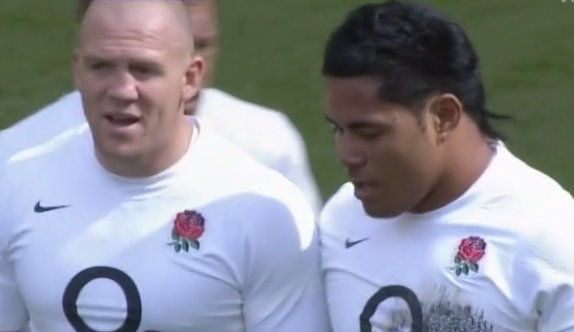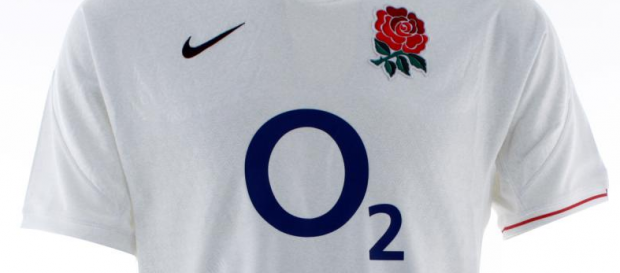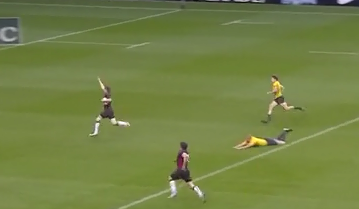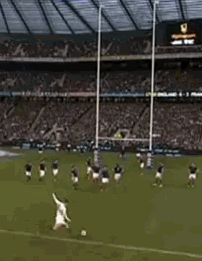I’m not going to lie, if England win this World Cup I will just about give up on life. I am barely coping with the smarmy gits beating us at cricket, and if rugby was added to that… well I am not sure I could go on.
So to make sure that doesn’t happen I have done a bit of research into England- their strengths, their weaknesses, and how the Wallabies can knock them off. I hope you are reading this Robbie, because if we lose to the fucking Poms again… <shudder>
The Wallabies will face England in either the Semi-Final (if both sides top their pool and win their QF) or the Final (if one side finishes second in their pool and the other first, pushing the 2nd place team into the other half of the draw).
Likely best XV
- Andrew Sheridan
- Dylan Hartley
- Dan Cole
- Tom Palmer
- Courtney Lawes
- Tom Croft
- Lewis Moody
- Nick Easter
- Ben Youngs
- Toby Flood
- Mark Cueto
- Mike Tindall
- Manu Tuilagi
- Chris Ashton
- Ben Foden
There are a few contentious positions. The main one is who will partner Tindall in the centres, with exciting youngster Tuilagi fighting it out with the more experienced Shontayne Hape for the spot. Hartley will probably just edge veteran Steve Thompson for the hooking spot, while Flood and Johnny Wilkinson will both have a chance to stake their claim for 10 in the pool matches.
Injuries
Much like the Wallabies their injury toll isn’t too great, with halfback Danny Care being the only top line player to miss the RWC after going down in a recent trial. There are, however, a few players in the England squad carrying injuries- Lewis Moody (knee), Nick Easter (calf), Mark Cueto (back) and Ben Youngs (knee). All except Moody are expected to be fit for the first game against Argentina this weekend, with the senior breakaway returning the week after. Youngs is probably the most concerning for the Poms, as he has been out of the game for 10 weeks and his fitness is vital after the injury to Care.
Strengths
- Dynamic forward pack. Surprised? This has always been the focus of English rugby, and it is no different with this year’s squad. Put simply, they have plenty of big blokes who specialise in knocking other big blokes over. Andrew Sheridan, Dylan Hartley, Nick Easter and Tom Palmer are all big, bad bastards to name just a few. With front foot ball they are very, very hard to stop. But they also have some surprisingly skilful forwards in the shape of Courtney Lawes , Tom Croft and Lewis Moody.
- Scrum. Again a traditional English strength, and fairly self-explanatory given point 1. Their scrum has lost none of the punch it had when they beat us at Twickenham last year, or in Marseille in 2007 for that matter. However it is not unstoppable. Ireland and Wales have both managed to get a shove on in warm-up games this year, however neither came close to establishing dominance.
- Back 3. The creative centre of this England side, Foden, Ashton and Cueto have the potential to tear opposition teams apart given space and time. Whilst they lack the destructive power of Ioane or the evasive skills of JOC they make up for these shortcomings in sheer pace. You just can’t give them an inch of room. Northern Hemisphere sides have started to work this out, and their effectiveness was noticeably lessened during the recent trials.
- Simplicity of game plan. The Poms play a very simple style of rugby, and they know it very well. Hard running forwards create a platform which is used by straight-running backs. No frills, no dramas. In theory anyway. Their staring XV and playing style is largely settled, which is a luxury most sides don’t have, Australia included.
- Ben Youngs. He is the lynchpin of their game, and is critical in distributing quick ball and making good decisions. He was at his best against the Wallabies at Twickers, however has been off the boil in 2011 and is now carrying injury. Can he step back in to the side and regain form? Martin Johnson will be desperately hoping so.
- Kicking. Toby Flood and Johnny Wilkinson will be fighting for the English 10 shirt, and both are magnificent kickers. They can accrue points so easily that often try-scoring is irrelevant and unneeded. Once again this is hardly a surprise.
Weaknesses
- Creativity. Whilst it is a simple game plan, it is often very predictable. Although they are experienced, both Flood and Wilkinson are nonetheless very limited players with ball in hand. Their passing and game management are good, but without front foot ball they are usually without ideas. This has been the key source of frustration with England under Martin Johnson- when plan A works they are brilliant, but when it fails they have nowhere to turn.
- Centres. As I said above, depending on Johnson’s whims it will either be Hape/Tindall or Tindall/Tuilagi. Both Hape and Tindall are one-dimensional bashers who, whilst potent with front foot ball in space, lack the skills to really thrive in the big moments. Tuilagi is a hot prospect, but with only two tests under his belt he is very green. Defensively they will keep the midfield solid, but you can’t see their attack troubling good defensive centres like Smith, Fourie and McCabe.
-

Tindall and Tuilagi, the likely centre pairing Reliance on Youngs. Basically if Youngs is injured or out of form, England are in the shit. Their backup Richard Wigglesworth is no more than solid at international level, and does not provide a fraction of the creativity and skill that Youngs does at his best. Without decent service the already questionable England inside backs look all the weaker.
- Inexperience. Looking at their top-strength XV, only five featured in England’s 2007 World Cup squad. Most have only been playing at the top level for a couple of seasons. More importantly, these younger players are the key men for England- players like Ben Youngs, Chris Ashton, Courtney Lawes, Ben Foden. Will they perform in the big moments?
- Martin Johnson’s selection policy. MJ is notoriously conservative, however he must stick to the aforementioned young players if England are any hope of taking home Bill. If things start to look dodgy, he has been too willing to turn away from his young stars and throw in older more one-dimensional players like Louis Deacon, Hendre Fourie or Steve Thompson.
- Lack of a genuine world class fetcher. Lewis Moody is a good player but certainly not in the league of McCaw, Pocock or Brussow. Their ability to win the ball on the ground rests solely on physical power, which works wonders against smaller sides but against more physically able opponents it generally fails and can also give away copious penalties for diving over or side entry.
How do the Wallabies beat them?
- Front up physically. It is more pivotal than against any other team. Australia lost in November mainly due to losing the tackle. England were allowed to rumble forward unchecked, with almost no opposition at the tackle or at the ruck. This meant they had an almost limitless supply of quick ball to put their backs in space. If we play like we did at Suncorp we will be fine- dominant tackling, and hassling them at the breakdown. Slow their ball consistently and you are a good chance of victory. In the face of these tactics they quickly become conservative and predictable.
- Front up physically. It is that important.
- Vary our attack around the fringes. Their forwards are big but can be cumbersome. After a few hitups wide of the ruck, generally some space starts to appear around the pillar/post area. Genia will be key here, and it is pivotal he is fit and firing if we do face the Poms. He was great at spotting mismatches and gaps around the ruck against 3N opponents, and those opportunities will be almost doubled against England.
- Limit the space of the back three. Make sure kicks go out, or are contestable. Try and stifle any counter-attacks before they begin, as generally they try and get it wide as quickly as possible on turnover ball. It is all about having a set line with no gaps, as the English back 3 are not great at busting tackles. They thrive on speed and space.
- Kick our points. In November we lost by 17 points and JOC kicked a paltry 3/7. This is crucial as England’s big forwards give away plenty of penalties in their enthusiasm to belt blokes at the ruck, and keeping the scoreboard ticking over will in turn place more pressure on their backline to score in multiples of 5 not 3.
- Pressure their centres. They are the key nexus of the England backline, and if you limit their space and time in defence they are prone to making errors as they furiously try and give the ball to their rapid outside men. I would hope Pat McCabe or Ant Faingaa feature against England, as we desperately missed their defensive power and accuracy last year at Twickers.
- Front up physically.
These aren’t radical ideas, as England are play simple rugby. The sides that have beaten England in the last two seasons have beaten them by stopping their forward runners and confronting their backline with a solid defensive wall. It isn’t rocket science. Hopefully Robbie and the gang realise this and we will front up if we face the Poms.
What do you think? Are England contenders or pretenders?





